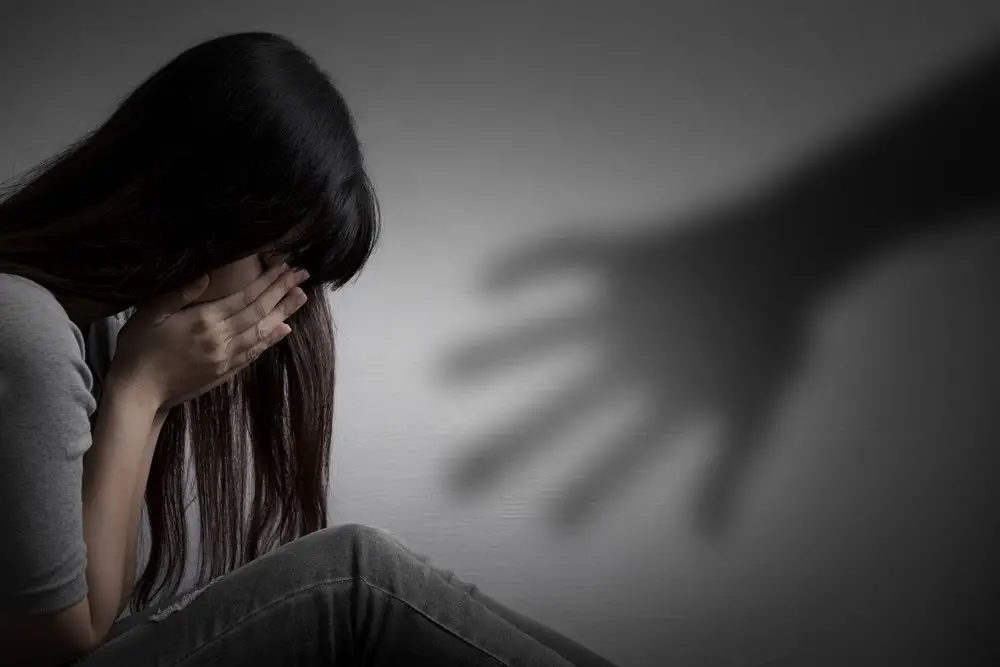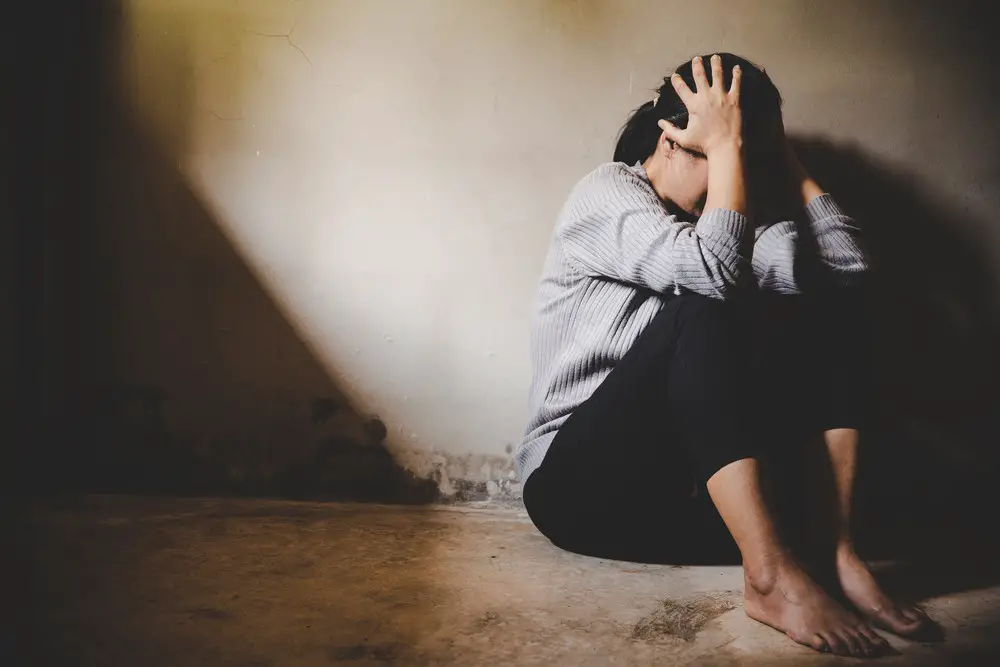As a BetterHelp affiliate, we receive compensation from BetterHelp if you purchase products or services through the links provided
Navigating the waters of a relationship when you suspect your girlfriend may have been a victim of sexual abuse is both complex and sensitive. It’s crucial to approach the matter with an open heart, a listening ear, and a nurturing spirit. The lasting scars of such trauma often manifest emotionally and psychologically, sometimes subtly influencing various aspects of your relationship.
Awareness of common signs that suggest past abuse can open doors to better communication and more profound empathy between you and your partner. Remember, though, the manifestations of past trauma can differ dramatically from one individual to another. Some might show explicit signs, while others may not. Therefore, your best ally in this journey is a steadfast commitment to sensitivity and responsiveness to your partner’s unique needs and expressions.
Key Takeaways
- Learn to identify and understand potential signs of past sexual abuse in your partner.
- Acknowledge the deep emotional and psychological impact that such past trauma can have.
- Prioritize open communication, empathy, and unwavering support in your relationship.

Understanding Sexual Abuse
Sexual abuse is a deeply traumatizing experience that can affect a person’s life. It can take different forms, such as assault, rape, childhood sexual abuse, child sexual abuse, and incest. Recognizing the signs that your girlfriend may have been sexually abused can help you provide the support she needs to heal and move forward.
First, it’s essential to recognize that sexual abuse is an act of power and control. It often leaves survivors feeling vulnerable, overwhelmed, and emotionally scarred. The psychological effects can manifest in various ways, including anxiety, depression, trust issues, and emotional outbursts.
It’s also important to understand that not every survivor will react similarly to their experiences. Some may exhibit certain behaviors or emotions, while others may respond differently. The key is to be open, understanding, and mindful of your girlfriend’s unique experiences and emotions.
In some cases, survivors of sexual abuse may have difficulty discussing their traumas. It may be hard for them to open up and share what happened, even with people they trust and care about. It’s essential to be patient and allow her to feel comfortable discussing her past if she chooses to do so.
Here are some ways to support your girlfriend through her healing process:
- Listen to her without judgment and validate her feelings and experiences.
- Offer love, understanding, and emotional support on her terms.
- Encourage her to seek professional help, such as therapy or support groups.
- Educate yourself about sexual abuse and its lasting effects to understand her experiences better.
- Be aware of potential triggers and take steps to minimize them in your relationship.
- Understand that healing is a process and will take time.
Remember, her healing journey is a personal and individual experience. You can help her work through her traumas and move towards a brighter future by showing her love, understanding, and support.
Common Signs of Past Sexual Abuse
It’s essential to recognize the signs that your girlfriend may have experienced past sexual abuse. By identifying these indicators, you can provide a supportive and understanding environment for her to heal and grow. Here are some common signs to look out for:
Changes in sexual behaviors: Your girlfriend might exhibit unusual sexual behaviors, such as being overly promiscuous or avoiding intimacy altogether. This can result from past abuse affecting her perception of sex and relationships.
Triggers and flashbacks: Victims of sexual abuse often experience triggers and flashbacks when reminded of their trauma. Pay attention if your girlfriend appears anxious, upset, or dissociates during intimate situations or when exposed to certain sounds, smells, or locations.
Physical symptoms: Past sexual abuse can manifest physically as well. Your girlfriend might struggle with chronic pelvic pain, tension headaches, or unexplained gastrointestinal issues.
Sleep disorders: Sleep disturbances such as insomnia, nightmares, and night sweats can occur due to past trauma. Notice if your girlfriend has difficulties falling or staying asleep, as these might be signs of unresolved issues.
- Eating habits and weight: Your girlfriend’s eating habits could be altered, resulting in weight fluctuations or obesity. Eating disorders might develop as a coping mechanism to deal with emotions relating to the abuse.
- Personal hygiene and appearance: A disregard for personal hygiene or sudden changes in appearance can indicate emotional distress. Observe if your girlfriend seems disheveled, neglects grooming, or consistently wears baggy clothing.
Self-harm and harmful behaviors: Self-harm or other harmful behaviors can indicate past sexual abuse. Be aware of any unusual marks, cuts, or burns on her body, and take note if she seems to exhibit self-destructive tendencies.
Sexual dysfunction: Your girlfriend may struggle with sexual dysfunction, such as pain during intercourse, difficulty achieving orgasm, or an aversion to physical touch.
Remember, a supportive and understanding partner can significantly impact your girlfriend’s healing journey. Acknowledge these signs and provide a safe space for her to express her feelings and seek professional help.

Impact on Relationships
In relationships, love and trust are essential for forming a solid bond. But when your girlfriend has experienced past sexual abuse, it may affect various aspects of your relationship. Here are some ways it can impact your connection and the dynamics between both of you:
Insecurity and Trust: Past abuse may leave her feeling insecure and vulnerable. It might be difficult for her to trust others, including you. To help her regain trust, it’s crucial to be patient and understanding.
Emotional Intimacy: It can be challenging for her to open up and be emotionally intimate with you. Encourage open communication and support her as she processes her emotions.
- Physical Intimacy: Similar to emotional intimacy, physical closeness can also be challenging for someone with past trauma. Be attentive to her boundaries and ensure she feels comfortable during intimate moments.
Setting Boundaries: Establishing healthy boundaries in your relationship is essential, especially if she was in an abusive relationship before. Communicate openly about what the two of you are comfortable with and respect her limits.
Abusive Patterns: Sometimes, past abuse can lead victims to either become overly defensive or to be drawn into abusive relationships subconsciously. Keep an eye out for any toxic patterns that may emerge in your relationship, and always strive for open communication and mutual respect.
Divorce and Past Relationships: If your girlfriend has experienced an abusive relationship that led to divorce, it may affect her perspective on relationships in general. However, being supportive and compassionate can help her see that not all relationships are the same and that healthy, loving partnerships exist.
Key takeaway: When dating someone who may have experienced sexual abuse, patience, understanding, and open communication are vital to maintaining a healthy and supportive relationship.

Emotional and Psychological Effects
Experiencing sexual abuse can leave deep emotional and psychological scars on your girlfriend. It’s important to be aware of this trauma’s various effects on her.
One common outcome is anxiety. Your girlfriend might feel constantly on edge, fearing the worst in every situation. Small triggers can send her into a spiral of worry that may be difficult to manage. You need to be patient and understanding when she’s feeling this way.
Depression is another possible outcome. Your girlfriend may experience periods of intense sadness, a lack of energy, and a general disinterest in activities she once enjoyed. When dealing with depression, try offering support without judgment or pressure for her to “snap out of it.”
Sexual abuse can also cause feelings of guilt and shame. Your girlfriend might blame herself for her abuse and feel too embarrassed to discuss these memories. Encouraging open communication and validating her feelings can help alleviate her burden of guilt.
Post-traumatic stress disorder (PTSD and C-PTSD) is common among survivors of sexual abuse. Repeated and intrusive thoughts about the abuse, nightmares, and flashbacks can make daily life extremely challenging. If you suspect your girlfriend is dealing with PTSD, encourage her to seek professional help to cope with these symptoms.
Lastly, sexual abuse can have a significant impact on overall mental health. Your girlfriend may struggle with unstable emotions and moods, memory issues, or even a disconnection from reality. Providing a supportive and loving environment can help her navigate this new territory.
Key takeaway: Recognizing the emotional and psychological effects of past sexual abuse is critical in supporting your girlfriend and understanding her needs. Be patient, empathetic, and encouraging as she works through the lingering impact of her trauma.

Coping Mechanisms of Survivors
When a survivor of sexual abuse starts to heal, various coping mechanisms can be helpful during their journey to recovery. Understanding these strategies can provide insight into your girlfriend’s past experiences and aid in supporting her through this process.
Establishing a safe environment: Creating a nurturing space for healing is essential. Encourage open communication and offer your understanding, patience, and support. Your girlfriend may initially find it challenging to trust, but having a secure environment built on love and respect can help immensely.
Self-care: Remind your girlfriend to prioritize self-care. This may include exercise, proper nutrition, setting boundaries, and relaxing. Maintaining good physical and mental health makes gaining confidence and regaining control easier.
Seek professional help: Encourage your girlfriend to pursue therapy or counseling. Experienced professionals can offer guidance and coping strategies tailored to her needs. Therapy can provide her with emotional support and the tools for long-term healing.
- Develop healthy habits: Encourage your girlfriend to engage in activities that promote self-esteem, such as hobbies or socializing with friends. This not only provides an outlet for negative emotions but it also helps build a positive self-image.
Remember, healing from sexual abuse is a long journey that may require patience and understanding. Your support plays a crucial role in helping your girlfriend find the strength to recover and rebuild her life.

Role of Therapy in Recovery
Seeking therapy can be a crucial step in healing for anyone who has experienced sexual abuse. As you support your girlfriend in her journey, it’s important to understand the role that therapy can play in her recovery.
Navigating the healing process: A skilled therapist can provide a safe space for your girlfriend to explore and come to terms with her past trauma. They’re trained to help clients sort through their emotions, identify triggers, and develop healthy coping strategies.
Tailored treatment: Therapists understand that each person is unique and work to create a personalized treatment plan suited to your girlfriend’s needs. This may involve counseling, group therapy, or other forms of psychological support.
- Building trust and communication: Therapy can help your girlfriend learn to trust again and foster stronger communication skills, which can, in turn, strengthen your relationship.
- Regaining control and empowerment: Sexual abuse can make survivors feel powerless and out of control. Therapy can help your girlfriend regain control and empower her to create her path to recovery.
Providing professional guidance: While you may want to be there for your girlfriend as much as possible, having a professional to turn to can be extremely valuable. They have the expertise to navigate the complexities of trauma and can offer support beyond what you can provide.
Remember, healing takes time, and your girlfriend’s journey may involve ups and downs. Being patient, supportive, and encouraging her to seek therapy can make a tremendous difference in her recovery.
![]() Move beyond pain and confusion together.
Move beyond pain and confusion together.
Helpful Resources and Support
If you suspect your girlfriend has been sexually abused, offering her support and guiding her to the right resources is essential. First of all, be sure to listen and validate her feelings. Encourage her to speak about her experiences if comfortable, but never pressure her.
You can begin by guiding her to RAINN (Rape, Abuse & Incest National Network) at rainn.org. RAINN operates the National Sexual Assault Hotline, which is available 24/7. The hotline connects callers to a trained professional who can provide support, information, and local resources.
Another excellent resource is the National Domestic Violence Hotline. They offer assistance not just for domestic violence but also for sexual assault survivors. If you’re unsure how to approach the situation, you can call the hotline, and they will guide you. Their number is 1-800-799-7233, or you can visit their website at thehotline.org.
Here are some more resources that might be helpful:
- Local support groups: Connecting with others who’ve had similar experiences can provide a sense of comfort and understanding. Seek out local support groups for sexual assault survivors.
- Counselors or therapists: Encourage your girlfriend to consider speaking with a mental health professional specializing in trauma and abuse recovery.
- On-campus resources: If your girlfriend is a student, colleges and universities often have resources like counseling centers, support groups, and sexual assault prevention programs.
Remember, in case of immediate danger, please call 911 or take your girlfriend to the nearest emergency room.
Supporting a loved one through their healing journey is crucial, and by providing these helpful resources, you’re making a difference in her life. Remember, every survivor’s experience is unique – be patient and stay by her side.

How to Compassionately Approach the Topic of Past Sexual Abuse with Your Girlfriend
Navigating the emotionally charged waters of past sexual abuse requires a delicate touch and thoughtful approach. This section will guide you through the nuances of initiating this vital yet sensitive conversation with your girlfriend. Follow these insights and strategies to provide the most supportive environment possible for discussing such a personal and impactful experience.
Choosing the Right Time and Setting
- Timing Matters: Look for a moment when you are not preoccupied with other concerns like work, family, or social obligations.
- Safe Space: Choose a comfortable and private setting where your partner will feel secure enough to open up.
Prepare Yourself First
- Educate Yourself: Before discussing such a sensitive topic, ensure you have at least a basic understanding of sexual abuse and its impacts.
- Check Your Emotions: Be aware of your emotional state. You must be calm, composed, and emotionally available during the conversation.
Initiating the Conversation
- Soft Opening: Start with a general conversation about feelings, emotions, or past experiences to gauge her comfort level.
- Be Direct but Gentle: If you feel the moment is appropriate, be honest but gentle in stating your concerns.
Allow Your Partner to Lead
- Listen More, Speak Less: The focus should be on your partner’s feelings, so listen actively and respond thoughtfully.
- No Pressure: Don’t press for details or make her feel obligated to share more than she is comfortable with.
Use Open-Ended Questions
- Invite Dialogue: Instead of asking yes-or-no questions, pose open-ended questions allowing deeper sharing.
- Be Mindful of Language: Avoid judgmental or accusatory language, sticking to neutral terms that encourage a safe conversation.
Acknowledge and Validate Feelings
- Validation is Key: Acknowledge her emotions and experiences without casting judgment or offering unsolicited advice.
- Offer Support: Make it clear that you are there for her, no matter what she is willing to share.
Setting Boundaries
- Respect Her Space: Your partner may need time and space to process the conversation.
- Limit Future Conversations: Let her dictate if and when the topic should be revisited.
By thoughtfully approaching the subject with these guidelines, you can create an environment conducive to open, honest, and empathetic conversation. Your goal should be to offer your girlfriend a supportive and safe space, respecting her unique experiences and emotions.

Signs That Counseling May Be Beneficial
For Your Girlfriend:
- Persistent Emotional Struggles: If emotional or psychological difficulties consistently affect her daily life.
- Trouble with Intimacy: Struggling with physical or emotional closeness could indicate that professional help is needed.
For You:
- Feeling Overwhelmed: If you struggle to provide the emotional support she needs.
- Communication Barriers: When conversations about sensitive topics become increasingly tricky or triggering.
For Both:
- Conflict and Tension: Persistent conflict or tension you can’t resolve between yourselves.
Solo or Couples Counseling: What to Choose?
Solo Counseling:
- Personal Space: Solo counseling allows for a focus on individual healing and self-exploration.
- Separate Issues: If either of you has issues you’d like to tackle alone before bringing them into the relationship.
Couples Counseling:
- Joint Challenges: Opt for this when communication or trust are mutual concerns.
- Unified Support: It can be a way to support each other through challenges that affect you both.
Supporting Each Other Through Therapy
- Be Respectful: Don’t press for information about individual therapy sessions unless your partner wants to share.
- Active Involvement: Show interest and involvement by driving your partner to sessions or asking how to support them better.
Setting Goals for Therapy
- Clarify Objectives: Whether improving communication, enhancing emotional intimacy, or individual healing, be clear about what you both hope to achieve.
- Be Realistic: Goals should be achievable and measurable; avoid setting too high expectations.
Monitoring Progress
- Regular Check-ins: Have occasional discussions about how you both feel therapy is helping you.
- Celebrate Milestones: Acknowledge both small and big accomplishments in your therapeutic journey.
By keeping these factors in mind, you’ll have a clearer understanding of when counseling may be necessary, how to approach it, and how to support each other throughout the process. Therapy is a brave step towards healing and improving the quality of your relationship. Setting goals and monitoring progress can offer tangible benchmarks in this vital journey.
Frequently Asked Questions
What behaviors might indicate a history of sexual abuse?
Some signs that your girlfriend may have experienced sexual abuse include nightmares, flinching at the touch, or displaying anxiety in certain situations. She might exhibit mood swings, avoid discussing the subject, or feel uncomfortable in intimate settings.
- Key takeaway: Be observant of any unusual behavior and provide support if needed.
How can one recognize emotional scars from past abuse?
Emotional scars from past sexual abuse can manifest as low self-esteem, feelings of worthlessness, or self-blame. Your girlfriend might isolate herself from others, appear anxious, or have difficulty trusting people.
- Key takeaway: Be empathetic and encourage open communication to help her feel heard and validated.
What are common trust issues in those with a history of sexual abuse?
People with a history of sexual abuse may struggle to trust others, especially in romantic relationships. They might be overly protective of their personal space, question your intentions, or find it hard to open up about their feelings.
- Key takeaway: Build trust by being consistently supportive, honest, and understanding.
How might past abuse affect someone’s intimacy and relationships?
Past abuse can lead to intimacy issues, such as difficulty connecting emotionally, fear of vulnerability, or disinterest in physical touch. Your girlfriend may also avoid or fear commitment or face challenges setting healthy boundaries.
- Key takeaway: Foster a safe and comfortable environment, allowing her to share her feelings and progress at her own pace.
What are potential coping mechanisms seen in people who were abused?
Survivors of sexual abuse may develop various coping mechanisms, such as substance abuse, self-harm, disassociation, or denial. They might use distractions, like work or hobbies, to avoid facing their trauma.
- Key takeaway: Encourage her to seek professional help and be supportive in her life.
How can one support a partner who may have experienced past sexual abuse?
To support your girlfriend, listen to her without judgment and let her share at her own pace. Educate yourself on the topic, be patient, and validate her feelings. Encourage her to seek professional help, like therapy, if necessary.
- Key takeaway: Offer your unwavering support and compassion to help her navigate her healing journey.
About Jacob Maslow
After surviving the traumatizing events of 9/11, I took it upon myself to heal through helping others. I’m the primary caregiver of my children and understand from first-hand experience the lonely paths you have to walk as a partner and parent when leaving an unhealthy relationship.
We’re all echoing in a dark space that doesn’t have to be this empty, and that’s been my mission since finding solace and recovery in therapy: To help comfort others who are still in shock and at the prime of their struggle.
I came across BetterHelp after searching for this type of community. I wanted to belong to a body of proactive therapists and supportive therapy veterans that allowed me to see other sides of the story.
It was unconventional, and that’s what attracted me most. During my most challenging times, when my ex-wife completely cut me off from my children, I found comfort and clarity through BetterHelp.
Instead of being chained to a strict therapist recommendation, I was in charge of who I felt understood my struggle most. That allowed me to find my true peace, as I was reunited with those who read behind my words and had first-hand experience with my trauma.
Recovery is a choice; with BetterHelp, that choice will be a few clicks away. You can join their couples-oriented platform, Regain.us, for those stuck with family estrangement and toxic relationship patterns.
- 7 Ideas to Help You Relax and Unwind on a Family Vacation - April 27, 2025
- How Having Cybersecurity Protection Helps You Relax - April 25, 2025
- 8 Reasons Why Spending Time Outside Calms You Down - April 25, 2025
This site contains affiliate links to products. We will receive a commission for purchases made through these links.




